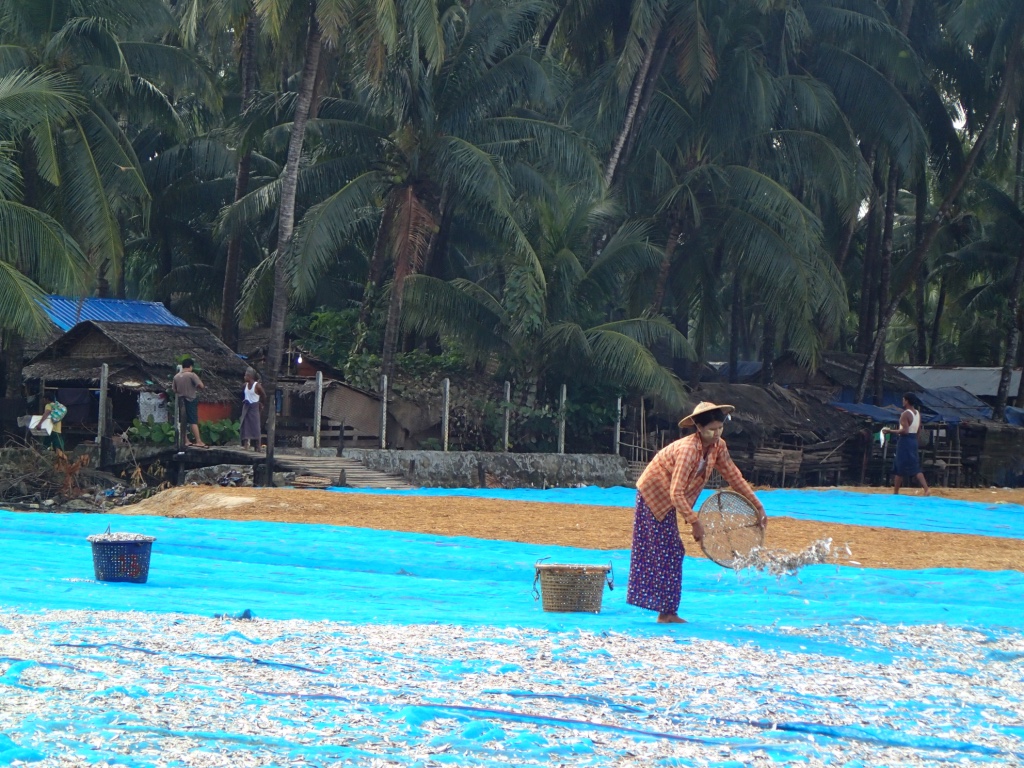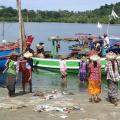
Myanmar is highly vulnerable to climate change: according to global climate risk index 2019, Myanmar is ranked the 3rd most vulnerable country in the world. This is a serious threat to Myanmar’s sustainable development, particularly Myanmar Fisheries Sector, to which a country largely depends on fish and aquatic products for its food and nutrition security and economy. Lives are already vulnerable in many fishery – dependent communities because of poverty; and the broader threat posed by climate change to development and food security is increasing. To help people out of poverty and to prevent from descending further into it, communities need to have a better understanding on how to identify their own vulnerabilities. This will require development of climate change adaptation practices, as well as disaster risk management and preparedness.
In order to address these challenges in Myanmar, GEF – funded FishAdapt Project is working together with MOALI – DOF (Department of Fisheries) with the aim to enable inland and coastal fishery and aquaculture stakeholders to adapt to climate change by understanding and reducing vulnerabilities, piloting new practices and technologies, and sharing information.
Through this project, a national Climate Change vulnerability assessment is carried out in Yangon, Ayeyarwaddy and Rakhine state to identify the vulnerabilities of the communities to the impacts of climate change. This foundational work is crucial for setting the project on the path to develop the community – based integration plan of actions.
 Capacity development is the heart of the project and it is highly recognized that increasing the participation of all stakeholders in capacity building activities is the key to strengthen the adaptive capacity and build the resilience of the stakeholders in all levels of interventions. With this regard, the project facilitates the forming of the implementing units in which each is composed of the members from, institutional partners, mainly Department of Fisheries and the implementing partners, local NGOs. These units are trained to empower the communities in order to apply ecosystem approaches, together with CCA and DRM, to enhance productivity, reduce disaster risks, adapt to climate change impacts, and promote natural resource conservation. This enhances the sustainability of capacity development to create the synergy and to achieve the goal of scaling up adaptation practices at the community level.
Capacity development is the heart of the project and it is highly recognized that increasing the participation of all stakeholders in capacity building activities is the key to strengthen the adaptive capacity and build the resilience of the stakeholders in all levels of interventions. With this regard, the project facilitates the forming of the implementing units in which each is composed of the members from, institutional partners, mainly Department of Fisheries and the implementing partners, local NGOs. These units are trained to empower the communities in order to apply ecosystem approaches, together with CCA and DRM, to enhance productivity, reduce disaster risks, adapt to climate change impacts, and promote natural resource conservation. This enhances the sustainability of capacity development to create the synergy and to achieve the goal of scaling up adaptation practices at the community level.
Through the vulnerability assessment and the application of practices and technologies, the FishAdapt project harnesses the coping strategies with the holistic approach for climate change adaptation. Effective fisheries management has always been a challenge and the project also provides support on organizing fisheries and aquaculture management units to ensure continued productivity of the resources by allowing the villagers to identify the issues and to find solutions themselves for EAFM/EAAM plans. These form the basis for interventions ensuring community engagement into integrated plan of actions and offer a far greater chance of developing sustainable management plans by balancing ecological and human well-being through good governance.
U Zaw Min Naing (DOF Township Officer, Toungup, Rakhine State) said, ‘The technical assistance and the trainings provided by FishAdapt project are really essential and effective for DOF staffs. It encourages us to harmonize with the fishers and fish – farmers to bring changes and make a difference in the communities when promoting good practices in climate change adaptation and fisheries management’.
In order to reduce the vulnerability to climate change and to mainstream climate change adaptation in all levels of planning, the whole process is not a one – off investment and intended to be continuous, progressive and iterative. This helps increase adopting approaches of locally – driven, gender – sensitive, participatory and transparent ones at the community level.
“I am very glad that the project came to our village and gave trainings. It really increases our knowledge and motivates us that everyone in the community can take part in the activities, particularly on how to identify our vulnerabilities to climate change by ourselves.", Daw Bi Bi Sein (AukSeikWin Village, Ayeyarwaddy Region).
FishAdapt Project will continue its support not only to enhance the adaptive capacity of the fishing communities and the stakeholders but also to find a common solution together with our partners. Environmental sustainability will be ensured through positive impacts of the introduced climate change adaptation plans, fisheries management plans, technologies and approaches on a range of ecosystem services, which will be developed in local community user areas and in the longer term on larger areas through upscaling of best practices.







